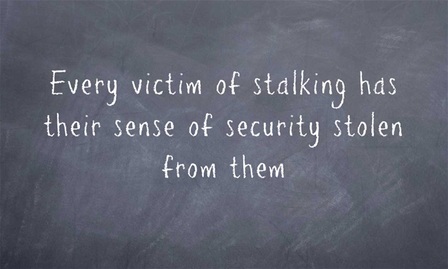|
by Camela Thompson
On January 12th, I met with a wonderful group of women to discuss All the Pretty Bones. We chatted before the book club meeting started, and I learned that they had been gathering to discuss books for six years. It was obvious that some deep friendships had been forged, and I watched as they cheered each other on through some big life achievements. When we sat down to talk about the book, the first item to come up was the relationship between my character Olivia and her stalker, Mark. One woman looked me in the eye. "You've been stalked, haven't you? There is too much realism for you to have made this up." I nodded and went into my story - the reality that inspired All the Pretty Bones. Unfortunately, I'm never the only person at these functions who has had an experience with a stalker. The volume of women forced to live in fear can be stifling. In this particular group, half of the women had dealt with a stalker. Half. This meeting was the first time most of them had discussed their stalker with the others. That's the amazing thing about books. Even paranormal thrillers touch on enough reality for people to relate. It creates an urge to share and allow ourselves to be vulnerable. The women became animated as they opened up about their past. Most of us did not have a relationship with our stalker, but a few people were stalked by an ex who refused to move on. The majority did not report the problem to the police or file for a restraining order. Only a couple of us took legal measures because of the level of aggression displayed by the stalker. Why does this happen so frequently? I can't help but wonder what makes people believe they have the right to forcibly insert themselves into someone's life. Z.D. Gladstone's guest post explains that the behavior is steeped in delusion, but that make up for what is robbed from the victims. Every victim of stalking has their sense of security stolen from them. In a lot of cases, their home is no longer a safe haven. Shadows become menacing, solitary moments are no longer peaceful, and too many moments are spent looking for signs of danger. This doesn't stop once the stalker decides to move on. The fear clings like the stink of a skunk, cropping up just when you think you've scrubbed everything clean. Is there anything that can be done to prevent this from happening to others? Is it a lack of psychiatric intervention? One of the hardest things about having a stalker is the knowledge that he probably moved on to torment someone else. What can be done to stop the cycle?
1 Comment
I wanted to express my gratitude for your insightful and engaging article. Your writing is clear and easy to follow, and I appreciated the way you presented your ideas in a thoughtful and organized manner. Your analysis was both thought-provoking and well-researched, and I enjoyed the real-life examples you used to illustrate your points. Your article has provided me with a fresh perspective on the subject matter and has inspired me to think more deeply about this topic.
Reply
Leave a Reply. |
Camela ThompsonFreelance writer and Dark urban fantasy author featuring vampires with bite. My BooksCategories
All
Archives
July 2020
|

 RSS Feed
RSS Feed